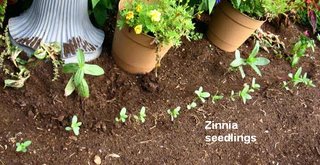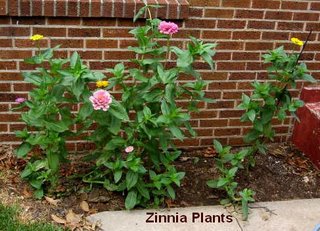Gardening and Stem-Cell Research
 Anyone who is not a gardener would probably not recognize the link between stem-cell research and a very normal part of growing plants. It starts with the fact that unless you always buy plants at a nursery (or hey, even occasionally at WalMart) most of what you grow starts with planting seeds. Also, anyone who's ever read the instructions on a seed package knows that most of the seeds that come up will have to be thinned out. Maybe I'm a little too sensitive, but I've check with other gardeners and they usually know what I mean when I say that I suffer a tiny (very tiny sometimes) bit of remorse every time I pull out and discard a little-bitty seedling to make room for it's buddies on either side to grow up into healthy plants. A plant needs growing room to produce the blossoms or vegetables or whatever. . . for which I planted the seeds in the first place. Thinning is not something that can be done once either because, as the plants grow, sometimes you have to go back and thin more than once, so each time, you destroy a plant that is further along in its life cycle.
Anyone who is not a gardener would probably not recognize the link between stem-cell research and a very normal part of growing plants. It starts with the fact that unless you always buy plants at a nursery (or hey, even occasionally at WalMart) most of what you grow starts with planting seeds. Also, anyone who's ever read the instructions on a seed package knows that most of the seeds that come up will have to be thinned out. Maybe I'm a little too sensitive, but I've check with other gardeners and they usually know what I mean when I say that I suffer a tiny (very tiny sometimes) bit of remorse every time I pull out and discard a little-bitty seedling to make room for it's buddies on either side to grow up into healthy plants. A plant needs growing room to produce the blossoms or vegetables or whatever. . . for which I planted the seeds in the first place. Thinning is not something that can be done once either because, as the plants grow, sometimes you have to go back and thin more than once, so each time, you destroy a plant that is further along in its life cycle.
Occasionally I do try to save some of the little ones that would otherwise be lost, by transplanting some to another location, but it's usually too hard to do, and too likely to disturb the plants on either side of the one you're trying to save. So you're left with a hard choice; destroy two plants trying to safe one or destroy one plant so that another can survive. (There's a human parallel here. Every time doctors and parents are forced to separate Siamese twins who are joined in fashion that would prevent them being able to live in the world, they're making life and death decisions that favors one life over another--particular when the twins share vital organs.)
But back to seeds. Of course, you could always plant seeds at sufficient distance from each other so that you don't have to thin out the ones that come up, but every gardener knows that not every seed will come up, or that what does come up will actually be a healthy plant, or even that what comes up will actually be the kind of plant you thought you were planting. Nurseries that produce seeds can and do make mistakes. So, you have to plant way more seeds than the plants you expect to grow to maturity.
One could make a connection with thinning seeds and drowning unwanted kittens when yo' mama cat gives in to a bout of indiscretion with a persuasive tomcat, but there is not really a legitimate connection since a responsible owner of cats will have them neutered thereby doing away with the moral question of drowning cats (or puppies) or whatever.

And not only does a gardener have to sacrifice beneficial plants, he also destroys life every time he pulls up a weed, and no body objects to weeding the garden on moral grounds, I hope. Although if there were something to be gained poltitically, I suspect somebody might. (An exception perhaps being the parable of the tares (Matthew 13:24-30.)
So the brutal reality of nature is that a lot of life and potential life has to die in order to make way for the life that survives. There's an old joke about the fact that every female alligator lays a zillion eggs every mating season and the male alligator eats 95% of them. There's a moral to the story; the reality is that if it weren't for the male alligator, we'd be up to our asses in alligators. By the same token, if every acorn produced an oak tree, we'd be up to our asses in oak trees. So, in the actual world that God created lots of potential life never gets to live. It's not tragic however, it's just an example of the tremendous natural abundance that God provides.
Which gets us to stem-cell research. The prohibition of stem-cell research is based on the notion that using the surplus fertilized eggs produced by fertility clinics for research "destroys life" in the same sense that abortion does. That's making an unacceptable, and one could say blasphemous connection. In the first place, not every fertilized egg can or should be implanted in a woman's womb--remember the story of the alligators and oak trees? In the second place, it puts a surplus fertilized human egg on the same moral level as one that has been implanted in a woman's womb, which really does have the potential to become a viable embryo. A surplus fertilized egg that will be discarded if not needed is not an embryo and only with a stretch beyond reason can it be considered as such. And finally prohibiting stem-cell research trivializes the issue of abortion, which is always morally reprehensible even in cases where it has to be considered the best of two bad options. (And using abortion purely for birth control, as if it were just a form of contraception, is always evil and, to a rational religious person, always sinful.)
Opposition to stem-cell research is a silly and misguided idea, and one deeply suspects those who argue for it are either invincibly ignorant themselves or are simply grandstanding to the ignorance and gullibility of a political base. Far from destroying potential life, stem-cell research has just the opposite potential; saving lives. Condemning stem-cell research is the actual immorality because it interferes with using reason--a gift from God to the human race--for good.
So, every time, I have suffer that little bit of guilt when I pull up a tiny seedling so that its brothers and sisters can live, I remember that because God has been so generous in providing the potential for life in the world he created, that I'm not destroying life, I'm saving it. If there were some way to use my discarded seedings for research, I'd do it in a heartbeat, but in the meantime, I'm satisfied that destroying unwanted seedlings is my only moral option.
Who said gardening was a mindless way of killing time? Hey, it's one of the few chances I get to think deep thoughts without being interupted by the telephone.

0 Comments:
Post a Comment
<< Home